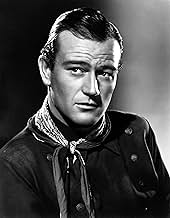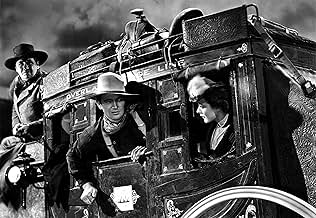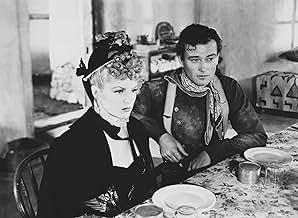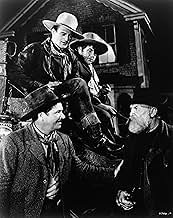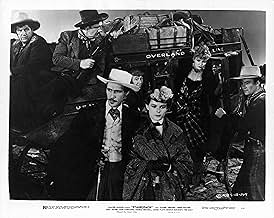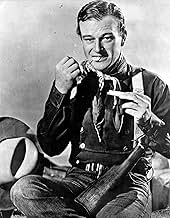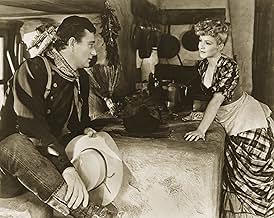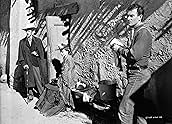Eine Gruppe, die mit einer Postkutsche unterwegs ist, rückt wegen der Bedrohung durch Geronimo zusammen und erfährt dabei mehr übereinander.Eine Gruppe, die mit einer Postkutsche unterwegs ist, rückt wegen der Bedrohung durch Geronimo zusammen und erfährt dabei mehr übereinander.Eine Gruppe, die mit einer Postkutsche unterwegs ist, rückt wegen der Bedrohung durch Geronimo zusammen und erfährt dabei mehr übereinander.
- Regie
- Drehbuch
- Hauptbesetzung
- 2 Oscars gewonnen
- 10 Gewinne & 5 Nominierungen insgesamt
- Girl in Saloon
- (Nicht genannt)
- Indian Scout
- (Nicht genannt)
- Bit Part
- (Nicht genannt)
- Bit Part
- (Nicht genannt)
- Lordsburg Saloon Owner
- (Nicht genannt)
Empfohlene Bewertungen
Although I miss seeing the desert landscape in full yellows and blues, this film is one of my favourite westerns and only suffers a little by being in black & while and not really enjoying the visual sweep that later Ford westerns had. The plot is quite simple on one hand - a group battle Indians on their way to a town while some of the characters confront their own battles. However this succeeds because it is more than just a B-movie shoot'em up, it has characters and sub plot.
The characters may be quite broad and the film may well use them like a disaster movie (set them up just enough to care about and then see who gets knocked down) but it does have touches that improve it. Characters are shunned due to their social status, `good' people are revealed to be not so good as they think themselves while `bad' people reveal themselves to have good hearts and the potential for redemption in their lives. While it isn't earth shattering it is well crafted and well written in the context of the traditional western.
Wayne is good and this film allowed him to step up from B-movie westerns to the type of films that made his career. The rest of the cast are also good in their various roles, while the characters are broad they all play it well, especially Trevor, Devine, Mitchell and Carradine.
Overall this is a solid western that has good action (include a great stunt that was lifted directly into Raiders of the Lost Ark) but also has characters and interactions which make for a polished and enjoyable movie.
But the real star of the show is John Ford, the director. To introduce and define nine characters in the context of a fast-paced western is no easy task, and he accomplishes it in masterly fashion. Much of the action takes place in the limited confines of a stagecoach, but Ford takes advantage of the limits by staging brilliant and subtle bits between characters; John Wayne casts sultry glances at Clare Trevor, who blossoms under his glance, the young calvary wife's eyes glaze over as the banker pontificates, and Doc sneaks sips of whiskey from the samples case while he solicitously keeps the wind from chilling the whiskey salesman. When the action moves outside, he films the action in dynamic angles and stunts that were the most daring of its time.
If you enjoy westerns and haven't seen this, you have a great night of film-watching ahead of you. And if the last time you saw Stagecoach was some midnight years ago when you wandered home for a bit of the late show before bedtime, watch it again and rediscover what a great western it is
Hokey? Not really -- the story's quite good, and for the most part, the acting's wonderful. John Wayne's great as the Ringo Kid -- this actually may be one of his best Western roles. The Ringo Kid is a murderer, looking to avenge his family, but he's also a fairly principled man. The role's a lot deeper and more complex than some of Wayne's later `white hat' heroes who were always perfectly good and flawless. The Ringo Kid wants a normal life, but at the same time knows he'll probably never have one, and John Wayne pulls off this internal conflict flawlessly. Wayne also has great chemistry with the wonderful Claire Trevor, who plays Dallas, the former lady-of-the-evening -- she's also seeking to create a new life, and the uncomfortable, almost shy way she reacts to Wayne's gentle, genuinely polite comments is terrific to watch. Like the Ringo Kid -- indeed, like most of the characters in `Stagecoach' -- Dallas wants to change her life around, but doubts that she can. The other characters in `Stagecoach' are excellent as well, but it's Claire Trevor and John Wayne who really make the film enjoyable. (Side note -- while he's quite good, I was shocked to read that John Mitchell actually won an Oscar for Best Supporting Actor for his portrayal of Dr. Josiah Boone in this film. His character's essentially a cross between W.C. Fields and Yoda, and while I'm not sure who else was in contention for the Best Supporting Actor award with Mr. Mitchell, I find it hard to believe that this was, in fact, the best supporting performance captured on film in the year 1939.)
John Ford's direction is excellent as well. `Stagecoach' is the first film where Mr. Ford used the breathtaking landscapes of Monument Valley, and even in black-and-white, they're still used to vivid effect. His action shots of an Apache attack and war raid are also stunning, even by today's standards. Ford also has great touch with changing moods in `Stagecoach' -- the film moves effortlessly from light comedy to tear-jerking drama, and the changes of mood never seem contrived. `Stagecoach' is clearly one of John Ford's better films.
Does `Stagecoach' have problems? Yes, but most of them are more a by-product of the customs and conventions of filmmaking in the 1930s. For example, the music is often obtrusive, and doesn't always fit with what's actually happening in a given scene. There's also not a lot of time spent exploring the character's backgrounds -- it would've been nice to know lot more about where the characters had come from (particularly Dallas), if only to help understand each character's motivations. Since this can be said about most films made during this era, it' somewhat forgivable. However, one significant flaw of `Stagecoach' itself is the character of Hatfield (John Carradine) -- while Mr. Carradine does a good job with the part, the character constantly contradicts himself. He behaves one way in one scene, then in a completely different manner in the next, and there's never a reason given for this. Add to this that Hatfield adds next to nothing in the film (his only useful purpose, apparently, is to ask Mrs. Platt (Lucy Mallory) `Are you all right?' every thirty seconds), and he becomes totally superfluous. If the part of Hatfield had been excised entirely from the script, "Stagecoach" would have been much better.
`Stagecoach' is not a typical Western (there's a lot more character introspection going on than blazing six-shooters), but it's an extremely entertaining film nonetheless. The memorable interaction between John Wayne and Claire Trevor alone makes it a near-classic. Grade: A-
The Ringo Kid has been wrongly accused of a crime and is on his way to Lordsburg to avenge both the false accusations and more importantly, the murder of his father and brother. Dallas (Claire Trevor) is implied to be a prostitute, and so is ostracized from Tonto (which means "stupid", "foolish" or "daft" in Spanish) by a self-stylized matronly moral majority. Doc Boone (Thomas Mitchell) is far more concerned with getting drunk than being a doctor, and is partially ostracizing himself from Tonto. Hatfield (John Carradine) is a "gambler gentleman" with a shady reputation and a false identity. Lucy Mallory (Louise Platt) is trying to get to her husband, who is in the military; she's in a surprisingly "secret" physical state. Samuel Peacock, whom everyone keeps mistaking for a reverend, is in the alcohol business and just wants to get back east to get back to his business. Henry Gatewood is a crooked banker trying to flee before his questionable dealings are discovered. And the stagecoach drivers consist of a lovable buffoon, Buck (Andy Devine) and the most forthright, straight arrow of the bunch, Marshal Curly Wilcox (George Bancroft).
Even though Stagecoach remains tightly focused on its wilderness road trip, that might seem like a large stable of characters to shape into a taut plot. Ford, working from script by Dudley Nichols and Ben Hecht, based on a short story, "Stage to Lordsburg", by Ernest Haycox (which itself bears a relation to Guy de Maupassant's "Boule de Suif", 1880), keeps the proceedings in check by only giving us the information we need to explore the evolving relationships, and only focusing on each character when they're important to the plot. This results in a few of the characters being functionally absent for extended lengths of time, but Ford can so easily establish a "deep" character with a minimum of screen time that the absences are not a detriment.
The principal focus, of course, is between Ringo and Dallas, as on a significant level, Stagecoach becomes a romance. They're initially brought together via their mutual ostracization, even among the ostracized, which gives them an immediate bond beyond their physical attraction towards one another. Wayne and Trevor are both fantastic in their roles, avoiding the occasional overacting by some other performers. But this is a film where it's difficult to count the slight overacting as a flaw, as it was more of a stylistic tendency of the genre during this period and it provides a nice counterbalance to Wayne and Trevor.
Stagecoach is also famous for its setting. Much of the film was shot in Utah's Monument Valley, along authentic stagecoach "roads". The (beautiful) starkness of the desert is often taken as a symbolic trip through a kind of purgatory for the characters, where they're left alone with their souls, their only connection being their small group, to contemplate their pasts and futures. Whether we choose to read something along those lines into the film or not, Monument Valley is at least a captivating presence in the film, although for me, the cinematography could have been better technically, especially considering that Stagecoach was made at the same time as The Wizard of Oz (1939). Ford's famous tendency to do only one take results in a couple minor gaffes, such as the initial shot of John Wayne--a zoom into a close-up--that is out of focus for most of the zoom.
As one could guess, eventually our passengers run into a band of Apaches, who are often interpreted as representing more of a "natural force" that our heroes must surmount. The climax features a fabulous extended chase/fight sequence with a number of amazing stunts by both humans and animals. The most impressive human stunts are performed by the legendary Yakima Canutt, including one that involved being dragged through the dirt by the horse-pulled stagecoach, which was moving along at about 40 miles per hour and supposedly missed running over Canutt by only 12 inches (30.5 cm). This scene was an inspiration for a similar stunt in Steven Spielberg's Raiders of the Lost Ark (1981).
Although it's not a "perfect" film to me, and it's not even my favorite western (I'm more partial to the classic spaghetti westerns, for example), Stagecoach is a very good film and was very influential, despite being made at a time when Ford was told that he was committing professional suicide by even contemplating a western. As the plethora of critical literature attests, it works on many levels, including as an allegorical microcosm of U.S. Depression-era society, and should be seen at least once by anyone serious about film literacy.
Wusstest du schon
- WissenswertesYakima Canutt explained how the stunt was accomplished where, as an Apache warrior attacking the stagecoach, he is "shot", falls off his horse, and then gets dragged underneath the stagecoach: "You have to run the horses fast, so they'll run straight. If they run slow, they move around a lot. When you turn loose to go under the coach, you've got to bring your arms over your chest and stomach. You've got to hold your elbows close to your body, or that front axle will knock them off." After the stunt was completed, Canutt ran to director John Ford to make sure they got the stunt on film. Ford replied that even if they hadn't, "I'll never shoot that again."
- PatzerBefore Ringo hands his Winchester rifle to Curley after finding him stranded outdoors on the stagecoach trail, he ejects a chambered round, which after flying behind his head, can be heard as a knock as if hitting the soundstage floor. Also, it would have been unrealistic to waste a live round of ammunition with hostile Indians in the area, especially after telling Curley that he (Curley) may need his Winchester.
- Zitate
Marshal Curly Wilcox: Come busting in here - you'd think we were being attacked! You can find another wife.
Chris: Sure I can find another wife. But she take my rifle and my horse. Oh, I'll never sell her. I love her so much. I beat her with a whip and she never get tired.
Dr. Josiah Boone: Your wife?
Chris: No, my horse. I can find another wife easy, yes, but not a horse like that!
- Alternative VersionenAlso available in a computer-colorized version.
- VerbindungenEdited into Laramie (1949)
- SoundtracksTrail to Mexico (Bury Me Not on the Lone Prairie)
(uncredited)
Traditional ballad
Variations played throughout as part of the score
Top-Auswahl
- How long is Stagecoach?Powered by Alexa
Details
- Erscheinungsdatum
- Herkunftsland
- Sprachen
- Auch bekannt als
- Stagecoach
- Drehorte
- Agathla Peak, Arizona, USA(Peak in background at start of stagecoach trip)
- Produktionsfirma
- Weitere beteiligte Unternehmen bei IMDbPro anzeigen
Box Office
- Budget
- 392.000 $ (geschätzt)
- Laufzeit1 Stunde 36 Minuten
- Farbe
- Seitenverhältnis
- 1.37 : 1
Zu dieser Seite beitragen




